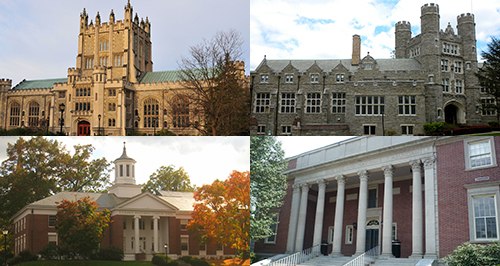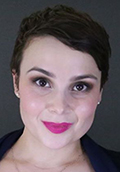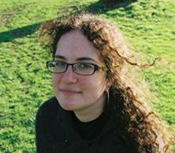
Clockwise from top left: Vassar, Bryn Mawr, Wheaton and Amherst Colleges. Photo of Thompson Library at Vassar from Wikimedia by Jim Mills.
The following guest post is a collaboration from Joanna DiPasquale (Vassar College), Amy Bocko (Wheaton College), Rachel Appel (Bryn Mawr College) and Sarah Walden (Amherst College) based on their panel presentation at the recent Personal Digital Archiving 2015 conference. I will write a detailed post about the conference — which the Library of Congress helped organize — in a few weeks..
When is the personal the professional? For faculty and students, spending countless hours researching, writing, and developing new ideas, the answer (only sometimes tongue-in-cheek) is “always:” digital archiving of their personal materials quickly turns into the creation of collections that can span multiple years, formats, subjects, and versions. In the library, we know well that “save everything” and “curate everything” are very different. What role, then, could the liberal arts college library play in helping our faculty and students curate their digital research materials and the scholarly communication objects that they create with an eye towards sustainability?
At Vassar, Wheaton, Bryn Mawr, and Amherst Colleges, we designed Personal Digital Archiving Days (PDAD) events to push the boundaries of outreach and archiving, learn more about our communities’ needs, and connect users to the right services needed to achieve their archiving goals. In Fall 2014, we held sessions across each of our campuses (some for the first time, some as part of an ongoing PDAD series), using the Library of Congress personal digital archiving resources as a model for our programming. Though our audiences and outcomes varied, we shared common goals: to provide outreach for the work we do, make the campus community aware of the services available to them, and impart best practices on attendees that will have lasting effects for their digital information management.
Joanna DiPasquale, digital initiatives librarian at Vassar, learned about personal digital archiving days from the Library of Congress’ resources and how they worked for public or community libraries. She saw these resources as an opportunity to communicate to campus about the library’s new Digital Initiatives Group and how each part of the group complemented other services on campus (such as media services, computing and preservation). Her workshop was geared toward faculty and faculty-developed digital projects and scholarship. Vassar began the workshops in 2012, and faculty continued to request them each year. By 2014, the event featured a case study from a faculty member (and past attendee) about the new strategies he employed for his own work.
Amy Bocko, Digital Asset Curator at Wheaton, saw PDAD’s success during her time as a Vassar employee. Now at Wheaton, Amy wanted to publicize her brand-new position on campus and ability to offer new digitally-focused services in Library and Information Services, and her Personal Digital Archiving Day brought together a diverse group of faculty members to work on common issues. The reactions were favorable and the attendees were grateful for the help they needed to manage their digital scholarship.Approaching everything as a whole could have been overwhelming, so Amy boiled it down to “what step could you take today that would improve your digital collection? which led to iterative, more effective results. Common responses included “investing in an external hard drive”, “adhering to a naming structure for digital files” and “taking inventory of what I have”. Amy made herself available after her workshop to address the specific concerns of faculty members in relation to their materials. She spoke at length with a printmaking professor that had an extensive collection of both analog slides and digital images with little metadata. They discussed starting small, creating a naming schema that would help her take steps towards becoming organized. The faculty member remarked how just a brief conversation, and knowing that the library was taking steps to help their faculty in managing their digital scholarship, put her mind at ease.
Rachel Appel, digital collections librarian at Bryn Mawr, wanted to focus on student life. Rachel worked directly with Bryn Mawr’s Self-Government Association to work specifically with student clubs to bring awareness about their records, help them get organized and think ahead to filling archival silences in the College Archives. Like the other institutions, PDAD provided a great avenue to introduce her work to campus. The students were also very interested in the concept of institutional memory and creating documented legacies between each generation of students. Rachel was able to hold the workshop again for different groups of attendees and focus on basic personal digital file management.Sarah Walden, digital projects librarian at Amherst, focused on student thesis writers for PDAD. Sarah worked with Criss Guy, a post-bac at Amherst, and they developed the workshop together. Their goal was to expose students to immediate preservation concerns surrounding a large research project like a thesis (backups, organization, versioning), as well as to give them some exposure to the idea of longer-term preservation. They offered two versions of their workshop. In the fall, they gave an overview of file identification, prioritization, organization, and backup. The second version of the workshop in January added a hands-on activity in which the students organized a set of sample files using the organizing-software program, Hazel.
Although our workshops had varying audiences and goals, they empowered attendees to become more aware of their digital data management and the records continuum. They also provided an outreach opportunity for the digital library to address issues of sustainability in digital scholarship.
This benefits both the scholar and the library. The potential for sustainable digital scholarship (whether sustained by the library, the scholar or both) increases when we can bring our own best practices to our constituents. We believe that PDAD events like ours provide an opportunity for college libraries to meet our scholars in multiple project phases:
- While they are potentially worried about their past digital materials
- While they are actively creating (and curating) their current materials
- When they move beyond our campus services (particularly for students).
While we dispense good advice, we also raise awareness of our digital-preservation skills, our services and our best practices, and we only see that need growing as digital scholarship flourishes. On the college campus, the personal heavily overlaps with the professional. We anticipate that we will be holding more targeted workshops for specific groups of attendees and would like to hear experiences from other institutions on how their PDADs evolved.




